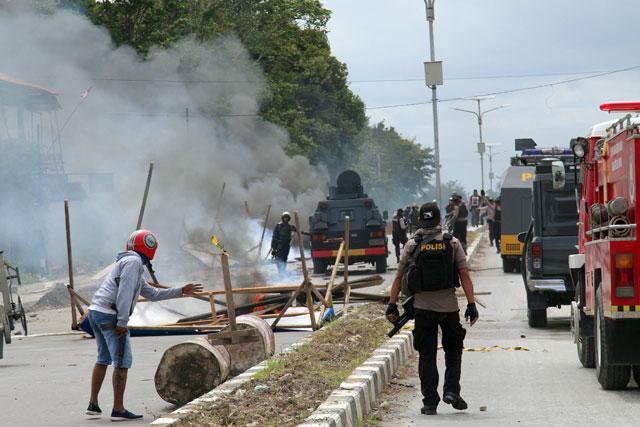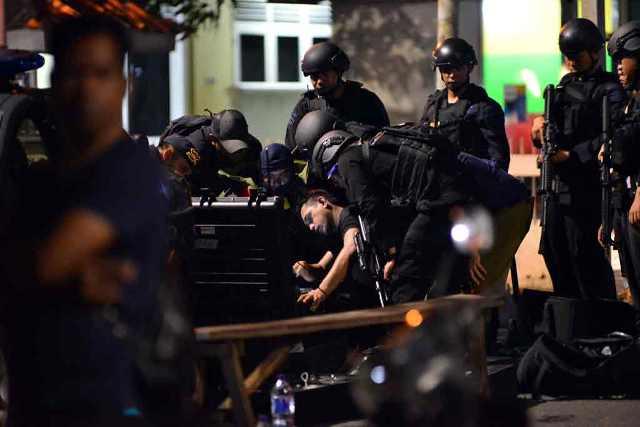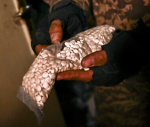You are here
Indonesia deploys more troops as Papua hit by fresh unrest
By AFP - Aug 21,2019 - Last updated at Aug 21,2019

Indonesian policemen disperse protesters in Timika, Indonesia's restive Papua province, on Wednesday (AFP photo)
MANOKWARI, Indonesia — Indonesia's Papua was hit by fresh unrest on Wednesday as more than 1,000 security personnel were sent to the restive region after violent protests that saw buildings torched and street battles between police and demonstrators.
Jakarta has called for calm in its easternmost territory — where an insurgency against Indonesian rule has simmered for decades — following riots triggered by the detention of dozens of Papuan students in Java at the weekend.
On Wednesday, about 1,000 people protested in the streets of Timika city, where an AFP reporter saw demonstrators throw rocks at the local parliament building as they tried to tear down its fence.
The crowd, which also reportedly pelted shops and homes with rocks, began to disperse as riot police fired warning shots.
Hundreds also marched through the streets of Sorong city, and hoisted the banned Papuan flag in the town of Fakfak on the western end of the island, which is divided between Indonesia and the nation of Papua New Guinea.
Police fired tear gas to disperse crowds in Fakfak after they set fire to a market and destroyed ATMs and shops, local media reported.
Several cities in resource-rich Papua were brought to a standstill this week, including Manokwari where businesses and the local parliament building were set ablaze by angry demonstrators.
Authorities are hunting for more than 250 inmates who had escaped from a prison in Sorong that was torched during the riots.
Several police officers had been injured, authorities said, and there are unconfirmed reports of wounded demonstrators. No deaths have been reported.
'Getting out of control'
Some 1,200 extra police and troops have been deployed to Manokwari and Sorong from other parts of the country, according to the government and Papuan authorities.
But security personnel were not equipped with live bullets, and the situation was "generally under control", National police spokesman Muhammad Iqbal said.
"It is standard that if things escalate [authorities] will deploy additional personnel," he added.
But the move could aggravate tensions, observers warned.
"It's making Papuans even more angry," said human rights lawyer Veronica Koman, a frequent commentator on Papuan issues.
"I'm really afraid this is getting out of control," she added.
The government has moved to slow down Internet connections in parts of Papua to stop the spread of online hoaxes it said could spark more demonstrations.
Anger boiled over at reports that authorities tear-gassed and detained some 43 Papuan university students in the country's second-biggest city, Surabaya, on Saturday — Indonesia's independence day.
Police in riot gear stormed a dormitory to force out students who allegedly destroyed an Indonesian flag, as a group of protesters shouted racial slurs at them.
Authorities said the students were briefly questioned and set free.
'Decades of frustration'
Indonesian leader Joko Widodo, who pledged to investigate the Surabaya incident, was expected to visit Papua next week.
"It is sad that the Indonesian government only listens to their decades of frustration when these people retaliated," said Andreas Harsono, a researcher at Human Rights Watch in Jakarta.
Papua has been the scene of a decades-old rebel insurgency aimed at gaining independence from Indonesia, which took control of the former Dutch colony in the Sixties.
Security forces have long been accused of committing rights abuses against its ethnic Melanesian population, who say they have not shared in the region's vast mineral wealth.
Tens of thousands of Papuans have been displaced amid intense fighting between troops and guerrillas after a rebel faction killed 19 construction workers at a remote jungle camp last year.
The employees of a state-owned contractor had been building bridges and roads as part of efforts to boost infrastructure in the impoverished region.
Related Articles
JAKARTA — Indonesia has cut off internet access in unrest-hit Papua over fears that a stream of offensive and racist online posts would spar
JAKARTA - Indonesian police have shot and killed 11 suspected small-time criminals and wounded dozens more in a crackdown before it ho
Indonesia pledged Saturday to investigate flight violations by AirAsia, as search teams found four large parts of the airline's plane that crashed into the sea last weekend with 162 people on board.


















